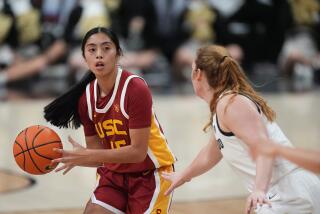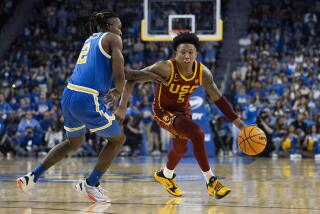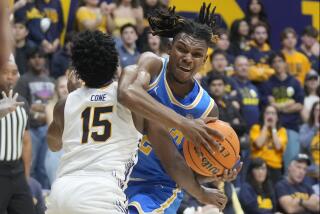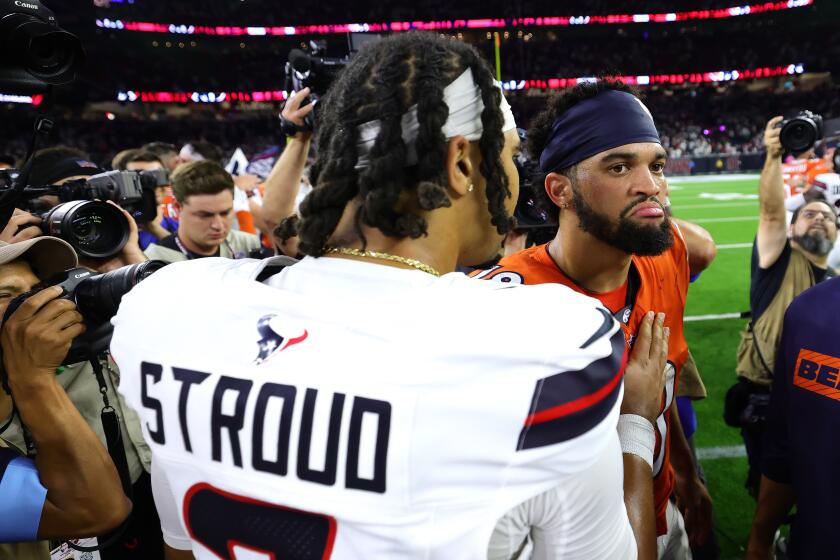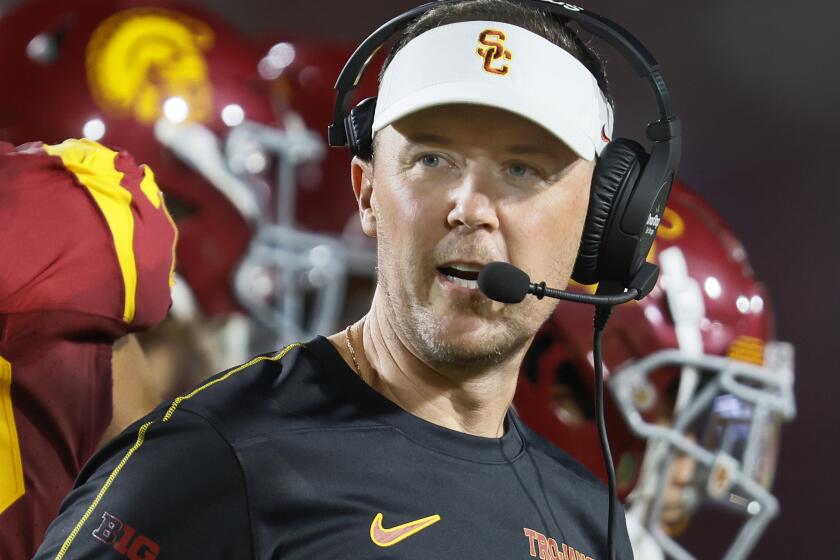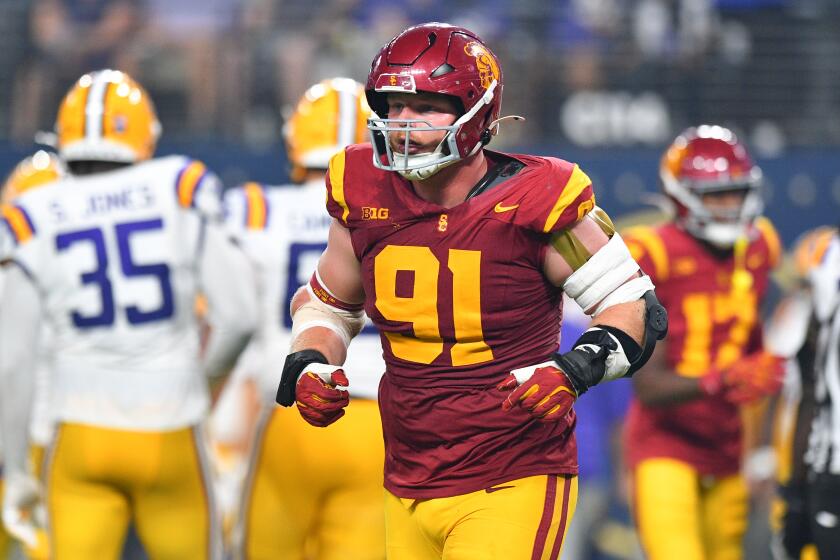Momentum in UCLA-USC series runs in streaks
The rivalry that splits Los Angeles like an earthquake fault has often been one-sided.
UCLA and USC — or is it USC and UCLA? — have taken turns playing king of the Santa Monica Mountains.
UCLA’s 38-28 victory last season shook things up, and the Bruins can hope it signals a shift in the terrain — another eight-game winning streak?
Or, from USC’s vantage point, was it merely a bump along the landscape? The Trojans won five more consecutive games after a streak-stopping, 13-9 loss in 2006.
Everyone might have a better idea of what last season’s result meant, or didn’t mean, after the Bruins and Trojans play football for the 83rd time Saturday at the Coliseum.
UCLA players enter the game thinking control of the city is within their grasp.
“When I first got here, people thought, ‘Another UCLA football team trying to do what they can to win football games,’” Bruins quarterback Brett Hundley said. “Now I think people understand it’s not a UCLA football team coming to play. It’s the UCLA football team coming to play.”
No surprise that USC linebacker Devon Kennard, a fifth-year senior who had to sit out last year’s game because of a torn chest muscle, sees things differently.
“We’ve got a great opportunity to go out there and take back L.A.,” he said, “and that’s what we’re focused on.”
Victory howl
The rivalry was born with Alpha Dog dominance, and both sides have been wanting to woof about superiority ever since.
Getting another victory this season would “put this program right where we want it to be,” UCLA linebacker Eric Kendricks said.
The Bruins’ place being? “Beating the people we should beat,” Kendricks said.
It’s an idea that has roots.
The same year the stock market crashed, so did UCLA. USC christened the series with a 76-0 pasting in 1929 and had a 12-2-4 series record until Red Sanders arrived in Westwood in 1949.
The Bruins lost again that year, but won six of the next eight under Sanders, who once said, “Beating ‘SC is not a matter of life and death, it’s more important than that.”
O.J. Simpson’s journey through the UCLA defense in 1967 put USC on a path to nine Rose Bowls in 13 seasons, with a 10-2-1 record against UCLA as the annual appetizer.
Coach Terry Donahue took the Bruins to three Rose Bowls in during the 1980s, wrenching away control of the series (UCLA went 6-3-1).
The last 23 years have been a contrast in extremes — an eight-game UCLA win streak, followed by seven- and five-game runs by USC.
Both programs have found that it takes more than one win to change the tide.
Behind the eight ball
Wayne Cook, UCLA’s quarterback from 1991-94, has a football at home with “4-0” written on it. The ball was awarded to seniors during the team banquet following the 1994 season, a memento to mark the first class that had not committed the cardinal-and-gold sin of losing to USC.
“Good year, bad year, it was important to keep beating USC,” Cook said.
Cook was a freshman on the 1991 team that won, 24-21, in a game that wasn’t decided until Arnold Ale sacked USC quarterback Reggie Perry with less than two minutes left. It was UCLA’s first victory in the series since 1986.
Cook doesn’t think the series really shifted that day. “The buildup to that year had some great games,” he said.
UCLA lost two games with future Super Bowl champion Troy Aikman at quarterback. Tommy Maddox’s first game against USC was blistering 45-42 shootout loss in 1990.
“In that era, UCLA football was right there,” Cook said. “The talent difference was close, not like during the Pete Carroll years [at USC] when we were getting whooped. UCLA just needed to get over the hump.”
Once over, it was a fun ride.
Even when USC couldn’t lose, it did. A 38-24 lead late in the 1996 game became a 48-41 double-overtime loss.
“The tide had turned,” Cook said. “The more we beat USC, the better our recruiting became.”
Even when the eight-game winning streak ended in 1999, the Bruins felt dominant.
“We thought we’d just get them the next year,” said DeShaun Foster, a UCLA running back from 1998-2001. “The talent was still rolling into Westwood.”
Rolling a seven
Petros Papadakis, a USC running back from 1997-2000, remembers the deed to Los Angeles passing to the Trojans. It wasn’t with the 1999 victory.
USC receiver Johnnie Morton had been wide open when Perry was sacked in 1991. Running back Chad Morton, Johnnie’s younger brother, guaranteed a USC victory in 1999 . . . in August. He was carried off the field by Trojans fans after the 17-7 win.
“That was the last time I saw fans rush the field at the Coliseum until this year against Stanford,” said Papadakis, now a TV analyst and L.A. radio personality. “It was great and all, but we were still a 6-6 team.”
USC won again in 2000, but coach Paul Hackett was fired. Carroll came in and the Trojans took a firm hold in 2001, Papadakis said.
Antuan Simmons made an acrobatic interception and raced like Traveler to the end zone, propelling the Trojans to a 27-0 victory, their third consecutive win in the series.
“He acted like he popped up his collar in the end zone and I thought, ‘OK, we’ve got these guys,’” Papadakis said.
Papadakis felt UCLA was the better team that year, but said, “You started to see Pete Carroll’s bludgeoning defense. USC guys were standing on [UCLA quarterback] Cory Paus’ neck. UCLA never recovered from that.”
The local talent stampeded toward downtown Los Angeles. The Trojans had won seven straight and were ranked No. 2 in the nation when UCLA ruined their national title chances with a 13-9 win in 2006.
“I popped champagne,” Cook said. “They didn’t get to eight.”
No, but USC did win the next five and the Bruins appeared desperate.
UCLA officials proclaimed the college football monopoly in Los Angeles was over in a 2008 newspaper ad. USC won, 28-7.
UCLA Coach Rick Neuheisel said the Bruins had “closed the gap” in 2011. The Trojans won, 50-0.
“We had them like they had us in the 1990s,” Papadakis said.
That was then. So what is now?
Papadakis: “UCLA punched us in the nose last season.”
Cook: “Hopefully we started a new streak.”
Twitter: @cfosterlatimes
Staff writer Gary Klein contributed to this article.
More to Read
Go beyond the scoreboard
Get the latest on L.A.'s teams in the daily Sports Report newsletter.
You may occasionally receive promotional content from the Los Angeles Times.
